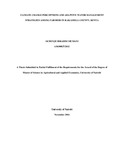| dc.description.abstract | A number of climate variables such as solar radiation temperature, cloud cover, precipitation,
wind speed, and humidity, affect water resources due to climate change. This has led to
changes in soil moisture, reduced stream runoff, reduced ground water recharge and
increased transpiration that has led to water stress which ultimately leads to decreased crop
yields. Deteriorating water resources at farm level caused by Climate change has led farmers
to undertake adaptive water management strategies to respond to the adverse effects of
climate change. This study assesses climate change perceptions by farmers and adaptive
water management strategies undertaken at farm-level in Kakamega County, Kenya. Ordered
probit and multivariate probit (MVP) were used to analyze data collected from 159
households in Kakamega County. Ordered probit was used to analyse the levels of farmers’
perception to climate change based on water resources while descriptive statistics were used
to characterise adaptive water management strategies undertaken by farmers in Kakamega
County. Multivariate probit was used to analyze factors affecting adaptive water management
strategies among farmers. Ordered probit results indicated that gender, farm size, distance to
the main source of water, contact with an extension officer, access to climate change
information via radio and wealth status significantly explained the level of farmers’
perception of climate change based on water resources. Major adaptive water management
practices identified in the area of study were: use of cropping strategy, irrigation and water
harvesting, soil and water conservation practices as well as protection of water catchment.
Study findings from MVP model showed that age, farmer experience ,farm size, distance to a
water source, produce market distance, distance to tarmac road, membership to a group,
access to extension services, access to climate information through agricultural extension
officers and climate change perceptions on amount of rainfall received influenced adaptive
water management strategies. These findings can therefore inform the national and county
v
government as wells as non-government organizations on major policy interventions that are
likely to support farmers to undertake adaptive water management practices. Examples of
such policy measures include better access to climate change and agricultural information,
market and wealth that will lead to resilience of water resources to climate change. Better
access to climate change and agricultural information can be facilitated by provision of free
extension services to the farmers whereas, improvement of rural infrastructure such as roads
will enhance access to both input and output markets. Increased access to resources can be
achieved by provision of affordable agricultural credits to farmers through establishment of
effective pro-poor microfinance institutions. | en_US |



